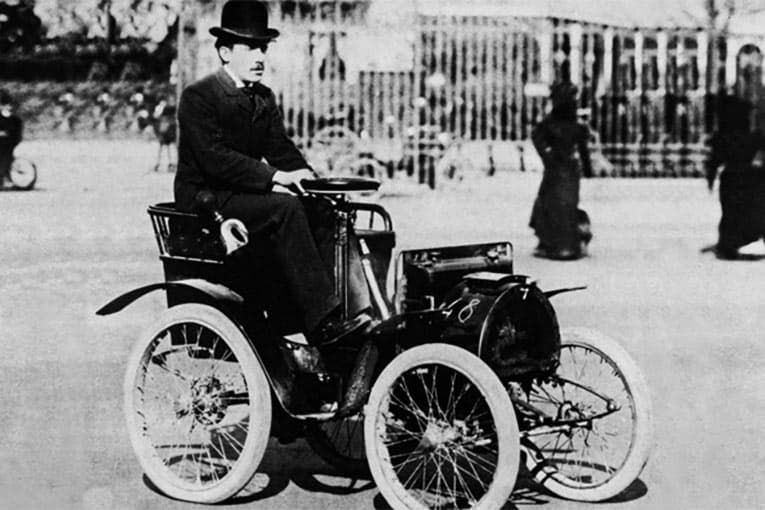
Louis Renault was born in 1877, in Paris, France. He was the fourth of six children of Alfred and Berthe Renault. Their father Alfred was a successful button manufacturer and fabric merchant. Louis Renault was fascinated by engineering and mechanics from an early age. At the family’s country home in Billancourt, outside Paris, he converted its garden shed into his first workshop.
At the age of 21, he built his first car, the Voiturette Type A. It featured a single-cylinder engine, a universally jointed driveshaft and a three-speed gearbox with the third gear in direct drive. He patented this system a year later. Seeing the commercial potential of the Voiturette, Louis teamed up with his two older brothers, Marcel and Fernand, who had business experience from working in their father’s textile company.
In 1899 Renault Freres company was started on the outskirts of Paris in Boulogne-Billancourt. Business and administration was handled by the elder brothers, with Louis dedicating himself to design and manufacturing. To gain name for their cars, Renault brothers personally drove the cars in the city-to-city races and were successful too. However, after Marcel Renault died in the 1903 Paris – Madrid race, Renault quit racing.
Louis Renault devoted his energies to expanding the business with new designs. In 1907 Louis Renault visited Ford’s Highland Park assembly plant, and took ideas for the new manufacturing plant in Billancourt. After his brother Fernand retired for health reasons, Louis Renault took overall control of the company in 1908.

Louis Renault driving Voiturette Type AAs the owner of the Renault company, Louis Renault became one of France’s leading industrialists, competing against another automotive industry tycoon Andre Citroen. During the World War One, production at the Renault’s Billancourt plant increased significantly as Renault manufactured ambulances, trucks, airplane engines and shells to the French army. In 1918, at the age of 40, Louis wed 21 year old Christiane Boullaire. They had a son, Jean-Louis.
Difficult strikes and labour troubles effected the Renault’s car production in the 1930’s. After France surrendered to Germany in 1940, all of Renault’s plants were forced to produce armaments for the German war effort. When the Germans left Paris in 1944, Louis Renault was taken into custody. He died a month later in suspicious conditions. His company was nationalized by the French government under General Charles de Gaulle, after having been classified as an instrument of the enemy.










